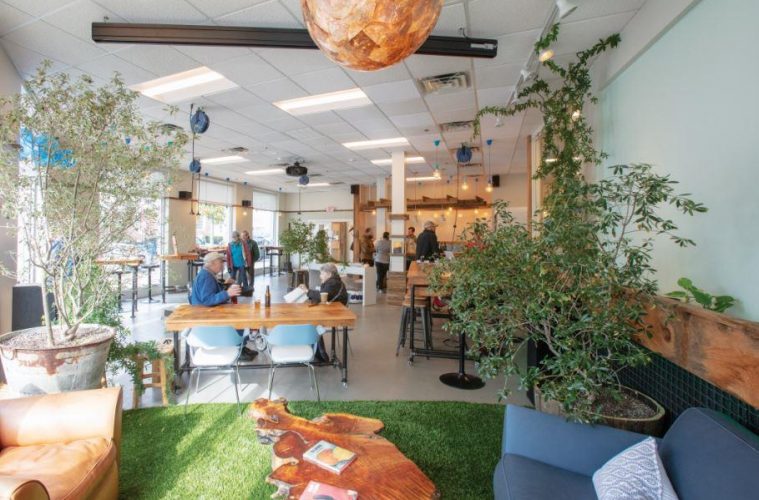When Scott Glosserman first moved from Los Angeles to Ipswich in early 2017, he worked from home, running his film distribution company from the changing room off his master bathroom. Eventually, though, his wife told him it was time to make new arrangements. “She said, ‘You need to go get an office,’” Glosserman laughs.
As he was checking out office options in Ipswich, he was struck—and inspired—by the empty retail storefronts downtown. He thought back to Los Angeles, full of creative people collaborating in coffee shops and coworking spaces. Perhaps, Glosserman thought, he could build something similar in his newly adopted hometown. “It occurred to me that we could help create vitality downtown by creating a coworking space,” he says. And so, Gathr Work was born.
Inside, Gathr feels like anything but a conventional office. Large windows and high white walls give the space a bright airiness. The furniture—all custom-made by a carpenter in Gloucester—and trim, and even some doors, were built using reclaimed wood from the farm of Ben Raymond, Glosserman’s partner and bother-in-law. Along one wall, a hydroponic system is ready to grow greens and other edible plants. Kumquat and fig trees that made the journey from California with Glosserman thrive in sunny corners.

The front half of the space is an open-plan office dotted with desks, chairs, and upholstered furniture. Members can simply use whatever seating and surfaces are open. The back is occupied by individual offices that workers can rent on a monthly basis. Conference rooms are available, and a soundproof pod even allows workers to make phone calls in relative privacy.
All of this creates a vibe that is organic and welcoming yet still clean and professional. “It’s not just a cookie-cutter office space,” Glosserman says. “We really wanted to bring some serious design and quality to the place.”
Coworking has been a growing phenomenon for the past decade, as more employers embrace flexible, remote work arrangements and more workers turn to freelance and contract jobs. Today, chains like international giant WeWork and Boston-area Workbar dominate the sector, providing standardized shared office space for remote workers and freelancers.
With Gathr, Glosserman decided to tweak the concept, adapting it to what he saw as an underserved market: smaller communities with high concentrations of professionals—like, for example, Ipswich. In the evolving business landscape, it is increasingly important that companies look beyond sprawling central offices, he says. “Talent is scattered everywhere,” he explains. “If businesses want to stay relevant, they need to be able to look in all the nooks and crannies.”
Monthly memberships and day passes are available. Current members include writers, lawyers, graphic designers, and even an aspiring lawyer studying for the bar exam.
The space offers the best of both worlds. Workers can avoid the frustrations of a daily commute and the distractions of working from home. The presence of other remote workers can provide camaraderie and even creative inspiration.
“It’s a professional, collegial environment where there isn’t laundry piling up,” says Caroline Savarese, a literary agent who uses the space rather than commuting in to her company’s Boston office or working from her kitchen table. “This is the kind of place I can take a client to and be proud of.”
Gathr Work held its grand opening in July. The early reaction has been overwhelmingly positive, Glosserman and Raymond say, and all of the private single offices were reserved by the time the space officially opened. “There’s a real opportunity in towns like Ipswich,” Glosserman says.
Raymond adds,“ And there’s also a need.

